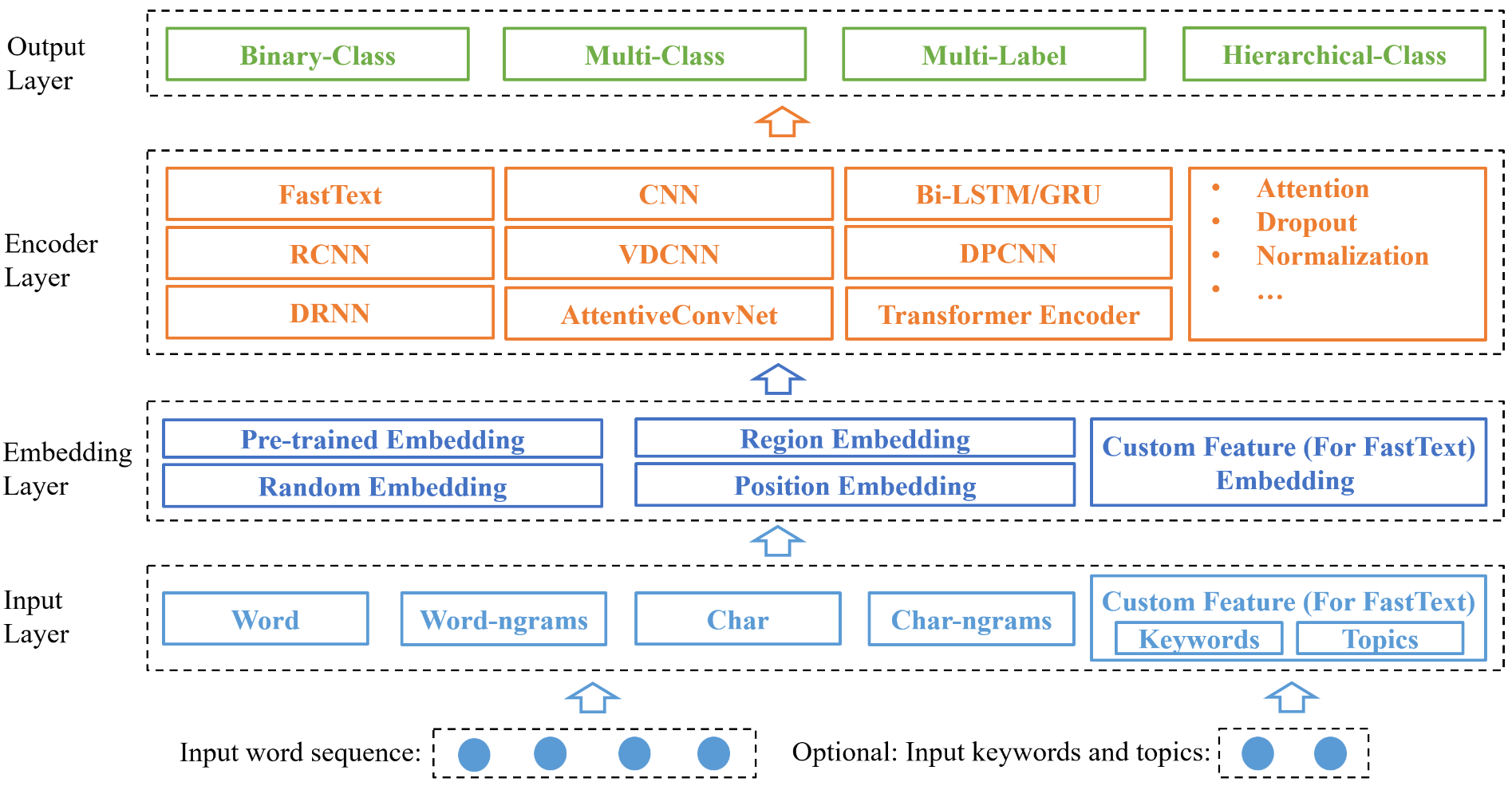NeuralClassifier is designed for quick implementation of neural models for hierarchical multi-label classification task, which is more challenging and common in real-world scenarios. A salient feature is that NeuralClassifier currently provides a variety of text encoders, such as FastText, TextCNN, TextRNN, RCNN, VDCNN, DPCNN, DRNN, AttentiveConvNet and Transformer encoder, etc. It also supports other text classification scenarios, including binary-class and multi-class classification. It is built on PyTorch. Experiments show that models built in our toolkit achieve comparable performance with reported results in the literature.
- Binary-class text classifcation
- Multi-class text classification
- Multi-label text classification
- Hiearchical (multi-label) text classification (HMC)
- TextCNN (Kim, 2014)
- RCNN (Lai et al., 2015)
- TextRNN (Liu et al., 2016)
- FastText (Joulin et al., 2016)
- VDCNN (Conneau et al., 2016)
- DPCNN (Johnson and Zhang, 2017)
- AttentiveConvNet (Yin and Schutze, 2017)
- DRNN (Wang, 2018)
- Region embedding (Qiao et al., 2018)
- Transformer encoder (Vaswani et al., 2017)
- Star-Transformer encoder (Guo et al., 2019)
- HMCN(Wehrmann et al.,2018)
- Python 3
- PyTorch 0.4+
- Numpy 1.14.3+
python train.py conf/train.json
Detail configurations and explanations see Configuration.
The training info will be outputted in standard output and log.logger_file.
python eval.py conf/train.json
- if eval.is_flat = false, hierarchical evaluation will be outputted.
- eval.model_dir is the model to evaluate.
- data.test_json_files is the input text file to evaluate.
The evaluation info will be outputed in eval.dir.
python predict.py conf/train.json data/predict.json
- predict.json should be of json format, while each instance has a dummy label like "其他" or any other label in label map.
- eval.model_dir is the model to predict.
- eval.top_k is the number of labels to output.
- eval.threshold is the probability threshold.
The predict info will be outputed in predict.txt.
JSON example:
{
"doc_label": ["Computer--MachineLearning--DeepLearning", "Neuro--ComputationalNeuro"],
"doc_token": ["I", "love", "deep", "learning"],
"doc_keyword": ["deep learning"],
"doc_topic": ["AI", "Machine learning"]
}
"doc_keyword" and "doc_topic" are optional.
| Dataset | Taxonomy | #Label | #Training | #Test |
|---|---|---|---|---|
| RCV1 | Tree | 103 | 23,149 | 781,265 |
| Yelp | DAG | 539 | 87,375 | 37,265 |
- RCV1: Lewis et al., 2004
- Yelp: Yelp
| Text Encoders | Micro-F1 on RCV1 | Micro-F1 on Yelp |
|---|---|---|
| HR-DGCNN (Peng et al., 2018) | 0.7610 | - |
| HMCN (Wehrmann et al., 2018) | 0.8080 | 0.6640 |
| Ours | 0.8313 | 0.6704 |
- HR-DGCNN: Peng et al., 2018
- HMCN: Wehrmann et al., 2018
| Text Encoders | RCV1 | Yelp | ||
|---|---|---|---|---|
| Micro-F1 | Macro-F1 | Micro-F1 | Macro-F1 | |
| TextCNN | 0.7717 | 0.5246 | 0.6281 | 0.3657 |
| TextRNN | 0.8152 | 0.5458 | 0.6704 | 0.4059 |
| RCNN | 0.8313 | 0.6047 | 0.6569 | 0.3951 |
| FastText | 0.6887 | 0.2701 | 0.6031 | 0.2323 |
| DRNN | 0.7846 | 0.5147 | 0.6579 | 0.4401 |
| DPCNN | 0.8220 | 0.5609 | 0.5671 | 0.2393 |
| VDCNN | 0.7263 | 0.3860 | 0.6395 | 0.4035 |
| AttentiveConvNet | 0.7533 | 0.4373 | 0.6367 | 0.4040 |
| RegionEmbedding | 0.7780 | 0.4888 | 0.6601 | 0.4514 |
| Transformer | 0.7603 | 0.4274 | 0.6533 | 0.4121 |
| Star-Transformer | 0.7668 | 0.4840 | 0.6482 | 0.3895 |
- performance got with 300d pretrained glove embedding
| Text Encoders | Hierarchical | Flat | ||
|---|---|---|---|---|
| Micro-F1 | Macro-F1 | Micro-F1 | Macro-F1 | |
| TextCNN | 0.7717 | 0.5246 | 0.7367 | 0.4224 |
| TextRNN | 0.8152 | 0.5458 | 0.7546 | 0.4505 |
| RCNN | 0.8313 | 0.6047 | 0.7955 | 0.5123 |
| FastText | 0.6887 | 0.2701 | 0.6865 | 0.2816 |
| DRNN | 0.7846 | 0.5147 | 0.7506 | 0.4450 |
| DPCNN | 0.8220 | 0.5609 | 0.7423 | 0.4261 |
| VDCNN | 0.7263 | 0.3860 | 0.7110 | 0.3593 |
| AttentiveConvNet | 0.7533 | 0.4373 | 0.7511 | 0.4286 |
| RegionEmbedding | 0.7780 | 0.4888 | 0.7640 | 0.4617 |
| Transformer | 0.7603 | 0.4274 | 0.7602 | 0.4339 |
| Star-Transformer | 0.7668 | 0.4840 | 0.7618 | 0.4745 |
Some public codes are referenced by our toolkit:
- https://pytorch.org/docs/stable/
- https://github.com/jadore801120/attention-is-all-you-need-pytorch/
- https://github.com/Hsuxu/FocalLoss-PyTorch
- https://github.com/Shawn1993/cnn-text-classification-pytorch
- https://github.com/ailias/Focal-Loss-implement-on-Tensorflow/
- https://github.com/brightmart/text_classification
- https://github.com/NLPLearn/QANet
- https://github.com/huggingface/pytorch-pretrained-BERT
- 2019-04-29, init version

